Bad debts are a fact of business life and most businesses will suffer a bad debt from time to time. This may be because the customer goes out of business after the work has been done or the goods have been supplied, or runs into financial difficulty resulting in them defaulting on the debt. Unfortunately, sometimes the customer may just not pay and refuse all attempts to recover it.
While there are actions that the business can take to recover the debt (such as making a claim using the Money Claim Online service), there is no guarantee that these will work, and the business may simply have to accept that the debt has gone bad.
Having suffered a bad debt, it would be adding insult to injury if the business had to pay tax on income that had not actually received. Fortunately, the tax system offers some relief for bad debts.
The way in which relief is given depends on whether the accounts are prepared under the cash basis or the accruals basis.
Cash Basis
One of the advantages of the cash basis is that it provides automatic relief for bad debts. Under the cash basis, income is not recognised until it is received, so if an invoice is not paid, it is not taken into account when calculating taxable profits. Consequently, there is no need for special rules to deal with bad debts.
Traders with cash basis receipts of £150,000 or less can elect to use the cash basis. It is the default basis for landlords with rental cash basis receipts of £150,000 or less, and landlords not wishing to use the cash basis must elect for the accruals basis to apply. Companies cannot use the cash basis to prepare their accounts.
Accruals Basis
Under the accruals basis, income must be recognised when earned. This means that if work is undertaken, the associated income is taken into account when the work is done not when the invoice is paid. Consequently, the invoiced amount will be reflected in the calculation of taxable profit, regardless of whether it has been paid. The amount owing will show in the balance sheet as a debtor of the business.
Normally, a deduction is not allowed for a debt owed to a business in computing the taxable profit. However, an exception is made for a bad debt and for a doubtful debt to the extent that it is estimated to be bad. This will be the total amount of the debt less any amount that the business may reasonably expect to receive.
Where a debt is bad or doubtful, a deduction can be made in the period in which the debt became bad or doubtful. This may not necessarily be the same period as when the income is taxed if at that point it was expected that the debt would be paid.
Example
ABC Ltd prepares accounts to 31 March each year. As a company, it prepares accounts using the accruals basis.
On 21 March 2022 it invoices a customer for £3,000.
The invoice is taken into account in calculating the taxable profit for the year to 31 March 2022.
In July 2022, the customer went into liquidation without paying the debt. Recovery looks very unlikely.
Tax relief is given in the form of a deduction of £3,000 when calculating the profit for the year to 31 March 2023 as this is the period in which the debt went bad.
Partner Note: ITTOIA 2005, ss. 35,; CTA 2009, ss. 55, 303,479.

